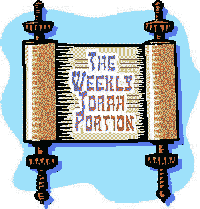|
Active Faith and Proper Service
By Michael Chessen
The Torah reading Shemini contains one
of the more difficult episodes of the Five Books of Moses, the death of
Aaron's sons, Nadav and Avihu. Although their deaths were very clearly an
act of God, and though there are some very compelling textual and
midrashic hints which offer possible bases for their divine punishment, we
do not have any simple and definite explanation of this tragedy. However,
it does leave us with some very important lessons in the areas of faith
and the proper service of God.
We should view Aaron's mute response to
the loss of his sons not as passive but as active. Whereas we might have
humanly expected Aaron to engage in possible criticism of his sons,
himself, or even of the Master of the Universe, he restrains himself and
sets a striking example of faith and the proper approach to mourning.
Modern Jewish law converts this example into the ruling that the first
three days of mourning are devoted not to words but to tears. One will
have ample time to give verbal expression to one's spiritual reckoning in
the weeks and years that follow.
Although we do not fully understand why
God took the lives of Nadav and Avihu, we nevertheless should take notice
of and internalize the lessons of their apparent misdeeds. The text states
that Nadav and Avihu brought a "strange" offering to the altar, which God
hadn't requested of them. This term could be compared to the Hebrew
translation of idol worship, which is literally "foreign" or "strange"
worship. In our day, we may not see people bowing before idols, but
rather, we do face a very real problem in that all too many of us become
accustomed to approaching God as "strangers", i.e., going through the
motions of observance devoid of heart and the will to seek intimacy with
our Creator. In our daily prayers, it is therefore incumbent upon us all
to fully reach a proper level of intention not only in proclaiming God's
oneness, but to maintain this level while reciting "you shall love the
Lord your God with all of your heart, all of your soul and all of your
might".
The Laws of Kashrut
by Avi Lazerson
In this weeks Torah Portion, the Jewish people are given the laws of kosher food. The Torah lists the two signs of kosher animals: 1. a split hoof, and 2. chewing the cud.
These two signs must be present in the animal. If an animal be found with only one sign, it is not kosher and may not be eaten.
One of these signs, the split hoof, is an exterior sign. We can easily detect if an animal has a split hoof by mere observation.
The second sign, that the animal chews it's cud, is an interior sign and not readily discerned by simple observation. We must investigate the animal in depth to know if it chew's its cud.
The pig has the first sign of being kosher. It has split hoofs. But it does not have the second sign. It does not chew it's cud.
It is said that the pig lays on its back in the mud and extends its hoofs to the heaven, saying, "look at my feet, they are kosher."
This is for us to realize, that people who want to decieve us will often point out their "kosher" traits, their so called well known "honesty" and "integrity." Don't be fooled by this sort of politician amongst us. He wants to decieve us.
A deeper look will reveal that he is not honest, nor does he possess any integrity.
May we all avoid the evil associations of this type and not fall prey to these un-kosher people.
Wishing you all a Shabbat Shalom !

|
